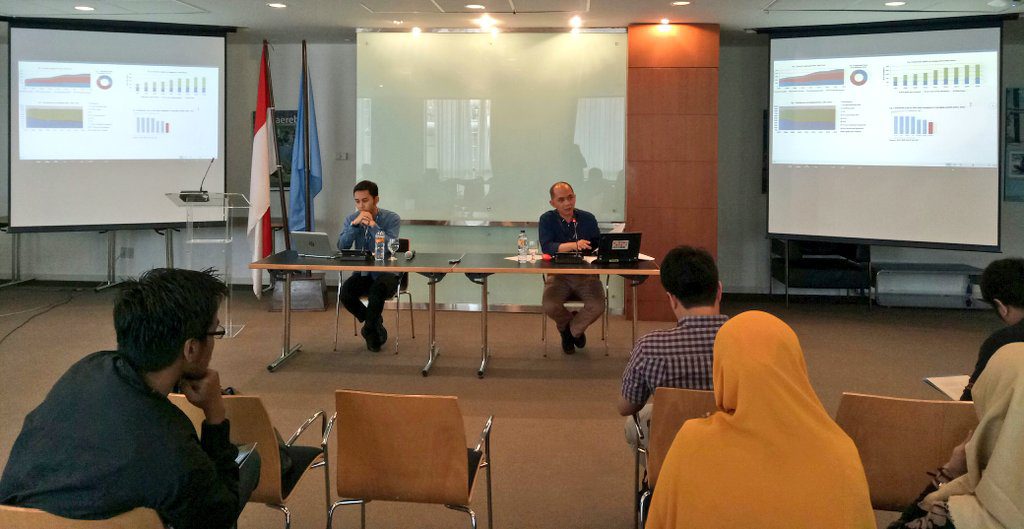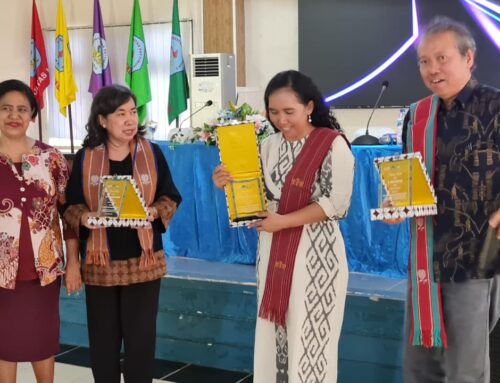The first FKP seminar of 2018 was hosted by United Nations Development Programme (UNDP) Indonesia on 18 January. The main theme of this month entitled “Towards the 2030 Agenda: Mobilising Innovative and Social Finance” encompasses four different topics discussing alternatives for securing financial resource to achieve sustainability in 2030. In this first session, M. Ikhsan Modjo (UNDP Indonesia) presented a collaborative study between UNDP Regional and Indonesia team (“Linking Resources with Sustainable Development Results in Indonesia”) and Greget Kalla Buana (UNDP Indonesia) brought up the topic of zakat and other Islamic finance to achieve SDGs in Indonesia. The seminar was opened by Francine Pickup as the Deputy Country Director of UNDP Indonesia.
Ikhsan Modjo started the talk off by providing a brief yet comprehensive description of the country’s economic condition in the past few years. In spite of successfully reviving the economy after 1998’s Asian financial crisis, Indonesia currently has been seeing slower trend of poverty reduction since 2010. Coupled by low tax revenue and slowing growth of investment, the country faces challenges to collect the money needed for funding sustainable development plans in the next years. UNDP offers to utilize the Integrated National Financing Framework (INFF). The INFF is a holistic approach toward managing and mobilizing domestic, international, public, and private financing for sustainable development results. It has six building blocks that gathers cross-institutional agents that play significant role in achieving and maintaining sustainable development. INFF, as stated, highlights the need of translating the visions into integrated financing plans.
In the second part, Greget Kalla Buana presented a study conducted by UNDP Indonesia and The National Board of Zakat (Ind: Badan Amil Zakat Nasional, Baznas) about development funding that can be collected through the mechanism of zakat, which is a mandatory giving comprising of 2.5% percent of income or wealth. As a country with the largest Moslem population in the world, Indonesia clearly has a huge potential of distributing wealth across social class and, at the end, achieving sustainable development from zakat and other Islamic finance, such as infaq and sadaqa (ZIS). The growth of ZIS accumulation reached an average annual rate of 38% between 2002 and 2016. However, the one of the challenges ahead is to change the paradigm of ZIS contribution; breaking the chain of poverty and achieving sustainable development would be more effective if ZIS is channeled systematically through certified institutions, rather than the customary personal giving.
The session followed was primarily discussing alternatives to accumulate ZIS fund effectively, including proliferation of ZIS managing institution certification.

![[FKP hosted by ANU Indonesia Project] COVID-19, food insecurity, and cash transfer in Cambodia](https://www.fkpindonesia.org/wp-content/uploads/2024/02/fkp-2024-03-21-thumbnail-500x383.jpg)
![[FKP hosted by ANU Indonesia Project] Is it a curse or blessing to have a resource-rich neighbour?](https://www.fkpindonesia.org/wp-content/uploads/2024/02/fkp-2024-03-13-thumbnail-500x383.jpg)
![[FKP hosted by Universitas Padjadjaran] Kesehatan ibu pasca melahirkan di Indonesia](https://www.fkpindonesia.org/wp-content/uploads/2024/02/fkp-2024-02-21-thumbnail-500x383.jpg)

![[FKP hosted by ANU Indonesia Project] The pursuit of food self-sufficiency in Indonesia: food-trade policy preferences during the administrations of Yudhoyono (2004-2014) and Widodo (2014-present)](https://www.fkpindonesia.org/wp-content/uploads/2024/01/fkp-2024-01-16-500x383.jpg)